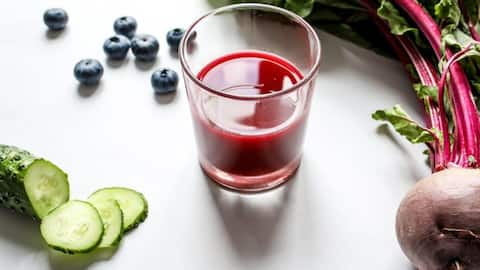Beetroot juice boosts athletic performance, research reveals
What's the story
Beetroot is gaining recognition as a performance-enhancing supplement for athletes, particularly runners and cyclists. A comprehensive review in 2020, encompassing 80 clinical trials, revealed that beetroot juice consumption offers significant performance benefits. In competitive sports where every second or centimeter matters, the advantages linked to beetroot intake can be substantial. For example, in a 16.1km cycling time trial, beetroot-related benefits equated to shaving off 48 seconds.
Varied results
Beetroot juice's effectiveness varies among athletes
Despite the overall positive findings, the 2020 review also discovered that beetroot juice did not yield performance benefits for women or elite athletes. This discrepancy could be due to an insufficient number of participants from these groups in the study. A subsequent systematic review in 2021, focusing on endurance athletes and comprising 73 studies, echoed similar results. Beetroot supplementation improved their time to exhaustion by an average of 25.3 seconds and increased the distance traveled by 163 meters.
Nitrate power
High nitrate content in beetroot enhances athletic performance
The International Olympic Committee has recognized beet juice as a legitimate sports food. The performance-enhancing properties of beetroot are primarily due to its high nitrate content. When consumed, nitrate is converted into nitrite by mouth bacteria and then transformed into nitric oxide under the stomach's acidic conditions. This process results in the dilation of blood vessels, facilitating quicker oxygen delivery to muscles and consequently reducing energy expenditure during exercise.
AIS recommendation
Australian Institute of Sport endorses beetroot supplementation
The Australian Institute of Sport (AIS) has classified beetroot as a Group A supplement, indicating strong scientific evidence supporting its use in specific sporting situations. The AIS recommends beetroot supplementation for exercises and competitive events lasting between four hours and 30 minutes and team sports involving intermittent exercise. For optimal performance benefits, the AIS advises that the beetroot product should contain between 350-600 mg of inorganic nitrate and be consumed two to three hours before training or competition.
Dietary considerations
Maintaining nitric oxide levels through vegetable intake
While it's challenging to consume enough nitrate directly from vegetables before an event, consuming five servings of vegetables a day can help maintain elevated nitric oxide levels in the blood. High-nitrate vegetables include celery, rocket, spinach, endive, leek, parsley, kohlrabi, Chinese cabbage, and celeriac. Additionally, it is advised to avoid using antibacterial products like mouthwashes, chewing gums, or lollies, as they kill the bacteria in mouth needed to convert nitrate to nitrite.
Side effects
Potential downsides of beetroot consumption for athletes
While beetroot powder and beetroot juice have become popular "functional foods" for enhancing athletic performance, it also has potential downsides. Beetroot consumption can cause urine turn red, complicating the determination of dehydration. Some individuals may experience an upset stomach after consuming beetroot juice. Therefore, athletes are advised to try drinking beetroot juice during training to identify any potential issues before a competitive event.
